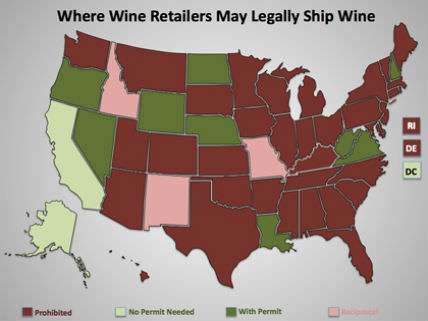No Beer of the Month for You: Bewildering Restrictions on Booze by Mail

The U.S. Postal Service, desperate for income, is hoping Congress will repeal a 1909 law that bars it from delivering "spirituous, vinous, malted, fermented or other intoxicating liquors of any kind." But even if the USPS gets its wish, it still will have to contend, as FedEx and UPS do, with an array of state restrictions that frustrate and bewilder consumers across the country.
In the 2005 case Granholm v. Heald, the Supreme Court said states may not prohibit out-of-state wineries from shipping directly to consumers while allowing in-state wineries to do so, saying such laws are unconstitutional barriers to interstate commerce. Under that decision, states could not discriminate against out-of-state wineries, but they could ban all direct wine shipments. According to the latest tally by the Wine Institute, 10 states take that approach: Alabama, Arkansas, Delaware, Kentucky, Massachusetts, Montana, Oklahoma, Pennsylvania, South Dakota, and Utah.
The other 40 states allow consumers to order wine from wineries, subject to volume restrictions, licensing requirements, and local bans. But they do not necessarily allow consumers to buy wine from out-of-state retailers, which can make ordering wine online an iffy proposition. According to the National Association of Wine Retailers (NAWR, formerly the Specialty Wine Retailers Association), only 14 states (plus the District of Columbia) allow their residents to receive wine shipments from retailers in other states: California, Hawaii, Idaho, Louisiana, Missouri, Nebraska, Nevada, New Hampshire, New Mexico, North Dakota, Oregon, Virginia, West Virginia, and Wyoming. Nine of those states require retailers to obtain special licenses, two (California and Hawaii) allow shipments without licenses, and three allow retailer shipments only from states that also allow retailer shipments. If you live in any other state and have bought wine from an online retailer, that merchant broke the law, perhaps unwittingly. The NAWR says "the level of enforcement of the prohibition varies from state to state."
If discriminating against out-of-state wineries is unconstitutional, you may wonder, why isn't discriminating against out-of-state wine merchants? The NAWR wonders the same thing. The organization "seeks to change these arbitrary, archaic and protectionist laws through lobbying, media and lawmaker education and litigation where states blatantly violate the Commerce Clause in their bans on out-of-state retailer shipping." But at least two federal appeals courts have upheld bans on direct shipments by out-of-state retailers, deeming them valid attempts to maintain the integrity of the three-tier alcohol distribution system, a system that the Supreme Court in Granholm called (quoting an earlier case) "unquestionably legitimate."
In 2009 the U.S. Court of Appeals for the 2nd Circuit upheld New York regulations that discriminated against out-of-state retailers, and in 2010 the U.S. Court of Appeals for the 5th Circuit upheld similar rules in Texas. The 5th Circuit observed that states with three-tier systems have always allowed producers of alcoholic beverages (the first tier) to be located in other states or countries but generally require that wholesalers and retailers be located within the state they serve. That rule, the court concluded, serves legitimate regulatory purposes beyond protectionism. Not surprisingly, alcohol wholesalers, who have a lucrative lock on the second tier, agree. They are the principal lobby supporting bans like those maintained by New York and Texas.
To make things even more confusing, the rules that apply to wine do not necessarily apply to beer and liquor. Partly the disparity is due to bans on direct shipments by retailers. While boutique wineries usually are happy to ship you a case, direct shipments by brewers and distillers are much less common, which means someone searching for a rare gin or unusual beer generally has to rely on retailers. But even if producers were willing to send you beer or liquor, your state might not let them. According to the Texas Alcoholic Beverage Commission, for instance, "It is not legal for a person in Texas to order/purchase malt beverages or distilled spirits from an individual or entity outside of Texas and have it shipped into Texas." So even a beer-of-the-month club that was a joint project of brewers would be prohibited from signing up Texans.
Texas was so keen to maintain its precious three-tier system for beer that for years it prohibited brewers from telling consumers where their products could be purchased. That regulation, which required breweries to disable the retailer location features on their websites for computer users inside Texas, was supposedly aimed at preventing coordination between producers and retailers, which might in turn lead to the sort of vertical integration that allowed big breweries to dominate the market prior to Prohibition. But the restriction was anti-competitive in practice, since beers produced by small, out-of-state breweries are harder to find than beers produced by local companies or national giants like Anheuser-Busch. A federal judge overturned the rule on First Amendment grounds in 2011.
The Texas legislature recently weakened the three-tier system a bit more by loosening the rules for breweries, which heretofore were prohibited from selling beer directly to consumers, and brew pubs, which heretofore were prohibited from selling beer through distributors. (Wineries, by contrast, could do both.) Now breweries that offer tours can sell their beer to visitors (only by the glass) instead of merely giving away samples, and brew pubs that sell beer along with food for on-site consumption can bottle it and sell it through distributors. Brew pubs cannot sell directly to retailers, which helps explain why beer wholesalers, who opposed similar legislation in 2011, were on board this time around. Conversely, the political clout of these mandatory middlemen means beer-of-the-month clubs are not likely to be legal in Texas anytime soon.
Addendum: As Vermont Beer points out, a new law that took effect on July 1 makes it legal for out-of-state breweries as well as wineries to ship their products directly to consumers in the Green Mountain State.


Show Comments (114)